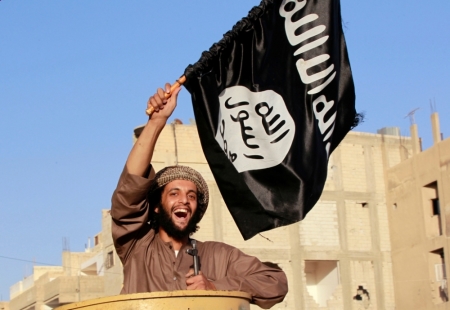The Great Wall of Saudi Arabia: Royal Family Constructing 600-Mile Barrier on Iraqi Border to Keep ISIS Militants Out

In response to the growing threat posed by the Islamic State terrorist group, the royal family of Saudi Arabia is having a 600-mile barrier constructed to completely block the Iraqi portion of the Saudi northern border, hoping to prevent ISIS militants from infiltrating the kingdom.
The planned fence structure will span the entire distance of the Iraq-Saudi border, from Jordan to Kuwait. The border barrier system will feature five layers of barbed wire fencing, a ditch, a patrol road, 240 rapid response vehicles, underground motion sensors, 40 watchtowers, radar, day/night cameras, seven command centers, 28 communication towers, 32 military response stations (equipped with helipads), and three rapid intervention teams. The entire system will also be connected through a fibre-optic communications network.
The idea for the "great wall" was first proposed during the height of the United States' invasion of Iraq in 2006. But, construction on the barrier did not begin until last September, after the Islamic State conquered large swaths of the neighboring Anbar province in Iraq.
The Telegraph reports that the Saudi government's urgency in completing the barrier has been renewed after ISIS militants attempted to infiltrate the border in early January near the Saudi border town of Arar. When the Saudi border patrol tried to halt the militants from crossing the border, the ensuing altercation left three border guards dead, including one of the top Saudi border commanders in the region. Four ISIS militants were also killed in the incident.
In response to the incident, the Saudi military has sent an additional 30,000 troops to secure the border area.
Some security analysts have labeled the incident ISIS' first attack on the Saudi Kingdom. However, it is unclear whehther attack would have actually happened if the border patrol had not spotted the militants crossing the border.
In late November, ISIS announced that it is planning to expand the caliphate into the Arabian Peninsula. With Saudi Arabia being the birthplace of Islam and also housing the religion's two most sacred holy sites, "The Holy Mosques" of Mecca and Medina, ISIS' quest of conquering Saudi Arabia is an ever-present goal for any Islamic militant group looking to further solidify its Islamic caliphate.
In the past few months, ISIS' top leader, Abu Bakr al-Baghdadi has called on Sunni extremists in Saudi Arabia to carry out attacks inside Saudi Arabia. Judging by the increase in violence against Shiite Muslims in the eastern Saudi town of al-Awamiya, Newsweek reports that Sunni extremists have likely started answering the caliph's call.
The Saudi government has taken other steps to help prevent the influence of the Islamic State from permeating into the country. The Daily Mail reports that the Saudi government has mobilized Sunni clerics to criticize the ISIS rhetoric as "deviant." In December, Saudi police arrested 135 people linked to terrorist organizations, such as ISIS.
In August, Saudi Arabia donated over 100 million to the United Nations Counter-Terrorism Centre in New York. Additionally, Saudi forces have also joined the U.S.-coalition airstrikes against the Islamic State's operations in Syria.





















